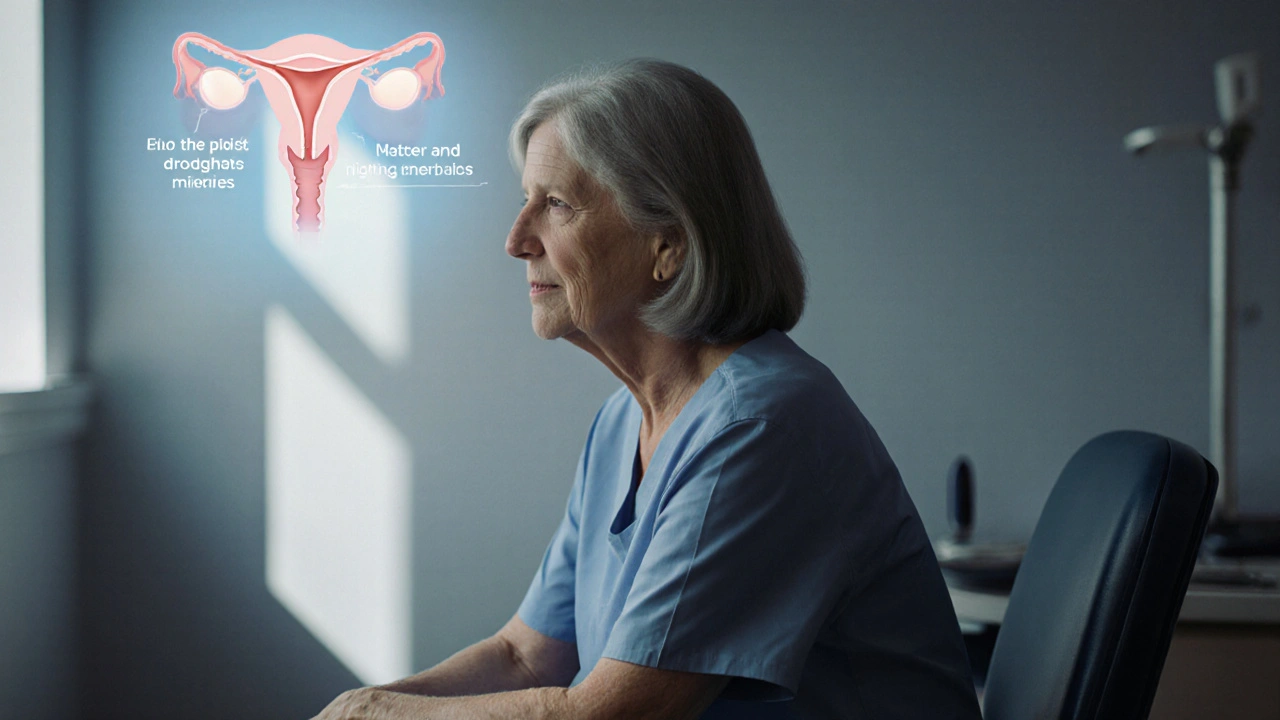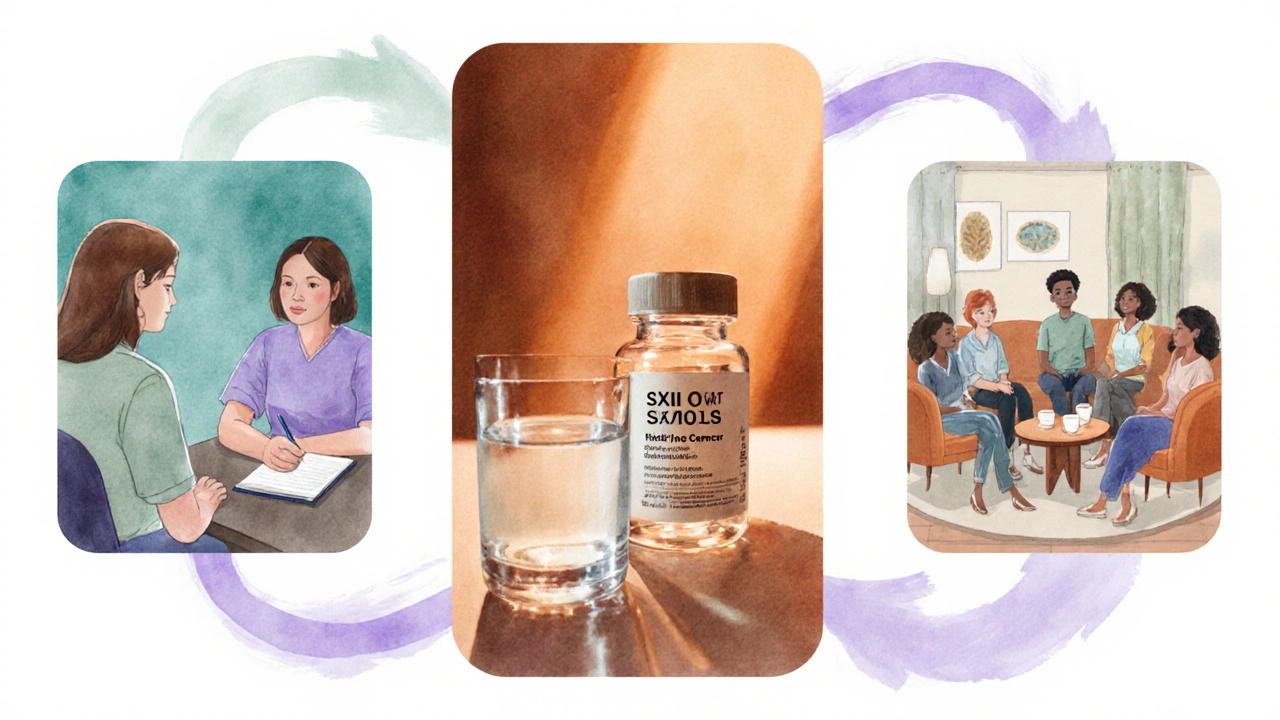Managing Anxiety and Depression in Ovarian Cancer Patients
 Oct, 11 2025
Oct, 11 2025
Key Takeaways
- Ovarian cancer often triggers anxiety and depression, affecting treatment outcomes.
- Early recognition of emotional symptoms can prevent worsening mental health.
- Combining psychotherapy, medication, and peer support offers the most balanced coping plan.
- Regular screening with tools like HADS or PHQ-9 helps clinicians track patients' mental well‑being.
- Practical self‑care habits-mindful breathing, gentle exercise, and structured routines-reduce stress daily.
What is Ovarian Cancer?
When you hear the term Ovarian Cancer is a malignant growth that starts in the ovaries, the two glands that release eggs each month. It accounts for about 3% of all cancers in women, but because early symptoms are vague, most cases are diagnosed at stage III or IV. The most common biomarker, CA‑125, rises in the blood of many patients, helping doctors monitor disease progression.
Why Mental Health Matters in Ovarian Cancer
Facing a life‑threatening diagnosis hijacks the brain’s natural stress response. Studies from the International Gynecologic Cancer Society in 2023 showed that up to 45% of ovarian cancer patients report clinically significant anxiety, while 38% experience moderate to severe depression. These numbers matter because untreated anxiety can impair chemotherapy tolerance, and depression often leads to missed appointments and poorer overall survival.
Common Emotional Reactions
Typical feelings include:
- Anxiety: racing thoughts about treatment outcomes, fear of recurrence, and worries about fertility.
- Depression: loss of interest, hopelessness, and persistent fatigue that isn’t explained by the cancer itself.
- Guilt-especially for mothers worried about leaving children behind.
- Isolation, as the disease often forces patients to retreat from social circles.

Spotting the Signs Early
Self‑monitoring tools are simple yet powerful. The Hospital Anxiety and Depression Scale (HADS) and the Patient Health Questionnaire‑9 (PHQ‑9) are short questionnaires you can fill out in the clinic or at home. A score above 8 on either subscale flags a need for professional help. Look out for physical cues too: unexplained weight loss, changes in sleep patterns, or a sharp drop in energy that doesn’t match chemotherapy side effects.
Effective Coping Strategies
There’s no one‑size‑fits‑all plan, but research points to three pillars that work best together: therapy, medication, and community support. Below is a quick comparison.
| Approach | Main Benefit | Typical Duration | Key Considerations |
|---|---|---|---|
| Psychotherapy (CBT, ACT) | Teaches coping skills, reduces negative thought loops | 6‑12 weeks, then maintenance | Requires a licensed therapist; insurance coverage varies |
| Antidepressants (SSRIs, SNRIs) | Stabilizes mood, can ease anxiety before therapy starts | Typically 3‑6 months, adjusted as needed | May interact with chemotherapy; monitor liver function |
| Support Groups (hospital‑based, online) | Provides shared experience, reduces isolation | Ongoing, as often as weekly or monthly | Group dynamics vary; find a facilitator comfortable with oncology topics |
When you combine ovarian cancer anxiety management with evidence‑based therapy, the odds of staying adherent to treatment rise dramatically.
Building a Personal Support Network
Start with three circles:
- Medical Team: Ask your oncologist to refer a psycho‑oncologist. Many cancer centers have a dedicated mental‑health professional trained in chemotherapy‑related mood changes.
- Family & Close Friends: Keep communication honest. Let them know when you need a listening ear versus practical help (e.g., grocery runs).
- Peer Community: Join groups like Ovarian Cancer Canada’s “Living With Ovarian Cancer” forum or local Durban support circles hosted by the Cancer Association of South Africa. Online platforms such as Cancer Chat Rooms often have moderated sub‑forums for mental health.
When to Seek Professional Help
If any of these occur, reach out immediately:
- Thoughts of self‑harm or suicide.
- Suicidal ideation lasting more than a few days.
- Rapid escalation of panic attacks that interfere with breathing.
- Persistent insomnia despite medication adjustments.
Emergency mental‑health services in South Africa include the Lifeline (0800‑567‑567) and the South African Depression and Anxiety Group (SADAG) helpline (0800‑100‑011). In the hospital setting, request an urgent referral to the psychiatry department.

Daily Self‑Care Practices
Small habits can create a buffer against stress:
- Mindful Breathing: 4‑7‑8 technique (inhale 4 seconds, hold 7, exhale 8) three times a day.
- Gentle Movement: 15‑minute yoga or walking sessions improve circulation and release endorphins.
- Journaling: Write down one worry and one gratitude each evening; this reframes negative loops.
- Nutrition: Focus on protein‑rich foods to support both chemo recovery and neurotransmitter synthesis.
Checklist for Coping with Anxiety and Depression
- Complete a baseline HADS or PHQ‑9 at diagnosis.
- Schedule a psycho‑oncology consult within the first month.
- Discuss any planned antidepressants with your oncologist for drug‑interaction checks.
- Join at least one support group (in‑person or virtual) within the first six weeks.
- Implement daily mindful breathing and record mood changes weekly.
- Review mental‑health scores every chemotherapy cycle; adjust plan as needed.
Looking Ahead: Maintaining Quality of Life
Survivorship doesn’t mean the mental‑health battle ends. Long‑term follow‑up clinics now often include a “Psychosocial Wellness” slot. Keep an eye on hormonal changes post‑surgery-especially if oophorectomy was performed-because sudden estrogen loss can trigger mood swings. Hormone replacement therapy (HRT) might be an option, but only after thorough oncologic risk assessment.
Remember, coping is a dynamic process. What works during active treatment may shift during remission, and that’s normal. Stay flexible, keep communication open, and never hesitate to ask for a new plan if your current one feels stale.
Frequently Asked Questions
How common is depression among ovarian cancer patients?
Around 35‑40% of ovarian cancer patients develop moderate to severe depression at some point during their treatment, according to a 2023 meta‑analysis of 27 studies.
Can antidepressants interfere with chemotherapy?
Some SSRIs (e.g., fluoxetine) can affect the metabolism of certain chemo agents like paclitaxel. Your oncologist will choose a medication with minimal interaction, often opting for sertraline or escitalopram.
What screening tools are recommended for anxiety?
The Hospital Anxiety and Depression Scale (HADS) and the Generalized Anxiety Disorder‑7 (GAD‑7) questionnaire are quick, validated tools used in oncology clinics worldwide.
Are online support groups safe?
Most reputable groups are moderated by healthcare professionals or certified volunteers. Verify the group’s credentials and avoid sharing personal medical details beyond what’s necessary.
How does hormone therapy affect mood after oophorectomy?
Estrogen replacement can alleviate hot flashes and improve mood, but it must be balanced against any residual cancer risk. A multidisciplinary team should evaluate the benefit‑risk ratio for each patient.

Suzette Muller
October 11, 2025 AT 20:48Thanks for sharing this thorough guide; it really highlights how mental health can shape treatment outcomes. I’ve seen patients feel less isolated when they have a simple breathing routine and a regular check‑in with their psycho‑oncologist. Keeping a short journal of worries and gratitude each night can be a low‑effort way to spot early signs of anxiety.
Josh SEBRING
October 19, 2025 AT 02:48Honestly, most of this feels like “checkbox medicine” – just another piece of paperwork to tick off. If you’re already overwhelmed, adding more questionnaires might actually increase the stress.
Lily Tung
October 26, 2025 AT 07:48The intersection of oncology and psychiatry is a field that demands both scientific rigor and compassionate care. Patients often report that the emotional burden of a cancer diagnosis eclipses the physical symptoms. When clinicians incorporate validated scales such as HADS or PHQ‑9 the data become actionable rather than anecdotal. However the mere presence of a scale does not guarantee that the patient will engage with the process. A therapist trained in cognitive behavioral techniques can guide the mind away from catastrophic thinking patterns. Medication, when judiciously selected, stabilises neurotransmitter activity and provides a necessary bridge to psychotherapy. Interaction effects between sertraline and certain chemotherapeutic agents have been documented, underscoring the need for interdisciplinary review. Lifestyle interventions, for instance mindful breathing, serve as an immediate anxiety reducer without pharmacologic side effects. Regular gentle movement improves circulation and releases endorphins that naturally elevate mood. Nutrition that emphasizes protein and omega‑3 fatty acids supports brain health during treatment. Peer support groups diminish the sense of isolation that often accompanies chronic illness. The role of family communication should not be underestimated; honest dialogue can alleviate feelings of guilt. Survivorship care plans now frequently include a psychosocial wellness appointment. Hormonal changes after oophorectomy can precipitate mood swings, making hormone replacement a nuanced decision. Ultimately the most resilient patients are those who adapt their coping toolkit as their disease trajectory evolves.
Taryn Bader
November 2, 2025 AT 13:48It feels like every appointment is a roller‑coaster of hope and fear. Knowing there are breathing tricks and support circles can be the safety harness you need.
Myra Aguirre
November 9, 2025 AT 19:48Simple habits like a daily walk or a quick breathing exercise can cut down on stress. Consistency beats intensity when you’re juggling chemo.
Shawn Towner
November 17, 2025 AT 01:48Even if it’s paperwork, having something concrete to track mood is better than guessing.
Ujjwal prakash
November 24, 2025 AT 07:48Wow!!! This post really covers the bases!!! I love that you mentioned both meds and community support!!! It’s crucial to remember that anxiety isn’t just “in your head” but a real physiological response!!!
Diane Helene Lalande
December 1, 2025 AT 13:48Absolutely, the comprehensive approach you highlighted gives patients a clear roadmap to follow.
Edwin Levita
December 8, 2025 AT 19:48The roadmap can feel like a lifeline when everything else seems chaotic.
Xander Laframboise
December 16, 2025 AT 01:48While the checklist is useful, many clinics lack the resources to actually implement every step.
Jason Petersen
December 23, 2025 AT 07:48Resource constraints are a real barrier to consistent mental‑health screening.
Melissa Gerard
December 30, 2025 AT 13:48Honestly, I think most of these “self‑care” tips are just marketing fluff 😊
Cindy Knox
January 6, 2026 AT 19:48It’s amazing how a simple gratitude journal can shift perspective. When you write down one good thing each night, the darkness feels a little less heavy. Keep it up and you’ll notice the change.
beverly judge
January 14, 2026 AT 01:48Integrating a gratitude practice alongside regular therapy sessions can reinforce positive neural pathways.